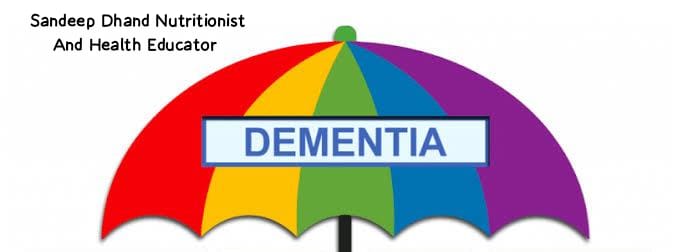Health Desk
Sandeep Dhand
Nutritionist And Health Educator
Introduction: What is Dementia?
Dementia is not just “forgetting things.”
It is a disorder that affects memory, thinking, behavior, and daily activities.
It is more common in older adults but not a normal part of aging.
Worldwide, millions of people live with dementia, and the number is increasing.
Understanding Dementia

Definition in Simple Words
Dementia is a syndrome (a group of symptoms) caused by brain damage or brain disease.
It slowly affects memory, judgment, language, problem-solving, and personality.
Dementia vs Normal Aging
Normal aging → some forgetfulness but still independent.
Dementia → memory loss so severe that daily life is disturbed.
Causes of Dementia
Common Causes
- Alzheimer’s disease – most common cause.
- Vascular dementia – due to poor blood flow or stroke.
- Lewy body dementia – abnormal protein deposits in the brain.
- Frontotemporal dementia – damage to the brain’s front and side lobes.
- Mixed dementia – combination of causes.
Less Common Causes
Parkinson’s disease
Huntington’s disease
Traumatic brain injury
Vitamin B12 deficiency
Infections (HIV, syphilis, meningitis)
Risk Factors of Dementia
Age (above 65 is higher risk)
Genetics (family history)
High blood pressure, diabetes, obesity
Smoking and alcohol use
Head injuries
Lack of exercise and poor diet
Types of Dementia Explained
- Alzheimer’s Disease
Progressive memory loss.
Difficulty recognizing people.
Language problems.
- Vascular Dementia
Step-by-step decline after strokes.
Trouble planning and organizing.
- Lewy Body Dementia
Visual hallucinations.
Sleep problems.
Movement difficulties like Parkinson’s.
- Frontotemporal Dementia
Personality changes.
Difficulty speaking.
Inappropriate social behavior.
- Mixed Dementia
Overlap of two or more types.
Symptoms of Dementia
Early Symptoms
Forgetting recent events.
Losing track of time.
Misplacing items.
Middle-Stage Symptoms
Difficulty recognizing family.
Repeating questions.
Getting lost in familiar places.
Needing help with dressing and bathing.
Late-Stage Symptoms
Severe memory loss.
Trouble swallowing.
Loss of physical abilities (walking, eating).
Complete dependence on caregivers.
How Dementia is Diagnosed
Medical history
Physical and neurological exam
Cognitive tests (memory, problem-solving)
Brain scans (MRI, CT)
Blood tests (to rule out vitamin deficiency, thyroid problems)
Treatment of Dementia
Medicines
Donepezil, Rivastigmine, Galantamine (slow down symptoms).
Memantine (for moderate to severe dementia).
Therapy and Non-Medical Care
Cognitive stimulation therapy.
Speech and language therapy.
Counseling.
Music and art therapy.
Lifestyle Support
Routine daily activities.
Memory aids (calendars, notes, alarms).
Safe and supportive environment.
Role of Family and Caregivers
Providing emotional support.
Ensuring safety at home (locking harmful items).
Communicating with patience.
Managing stress and taking breaks.
Prevention of Dementia
Stay mentally active (reading, puzzles).
Regular physical activity.
Healthy diet (fruits, vegetables, omega-3).
Avoid smoking and alcohol.
Control blood pressure, diabetes, and cholesterol.
Nutrition and Diet for Dementia Patients
Importance of Nutrition
Brain needs proper nutrition to function.
Malnutrition worsens dementia symptoms.
Foods to Include
Fruits and vegetables.
Whole grains.
Fish and flaxseeds (omega-3).
Nuts and seeds.
Milk, curd, paneer.
Foods to Avoid
Processed foods.
Excess sugar.
Fried foods.
Too much alcohol.
Sample Diet Plan for Dementia Patients
Morning
Warm water with lemon.
Oatmeal with fruits and nuts.
Mid-Morning
Fresh fruit (apple, papaya, banana).
Handful of almonds or walnuts.
Lunch
Whole grain roti.
Lentils/dal.
Spinach sabzi.
Curd.
Evening
Herbal tea with multigrain biscuits.
Dinner
Brown rice or quinoa.
Grilled vegetables.
Lentil soup.
Before Bed
Warm turmeric milk.
Living with Dementia – Quality of Life Tips
Create a daily routine.
Use labels and notes at home.
Encourage social activities.
Light exercise like walking.
Play music or involve in art.
Myths and Facts about Dementia
Myth: Only old people get dementia.
Fact: Younger people can also develop it.
Myth: Dementia is just memory loss.
Fact: It affects behavior, language, and daily life too.
Myth: Nothing can be done.
Fact: Lifestyle, therapy, and medicines can help.
Emotional and Social Impact
On patients: frustration, depression, anxiety.
On families: stress, financial burden, exhaustion.
Importance of community support groups.
Global Situation of Dementia
Millions of people worldwide are affected.
More common in countries with aging populations.
Governments and health organizations are working on awareness.
Conclusion
Dementia is a serious disorder that affects memory, behavior, and independence.
Early detection, proper treatment, nutrition, and family support can make life easier.
Awareness and compassion are the keys to helping dementia patients live with dignity.



